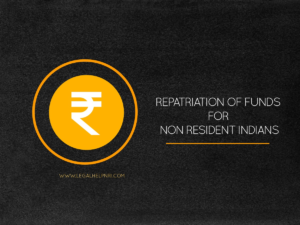 Repatriation :- is a process of bringing or sending money back to the foreign country.
Repatriation :- is a process of bringing or sending money back to the foreign country.
Many apprehensions that NRI has about investing in Indian property one is about the ways of repatriating funds back to their resident country i.e. abroad, after selling the property. Non-Resident Indian (NRIs), Person of Indian Origin (PIO) have immovable assets like money, house, land which is bought or inherited that they have left behind in the country and most of the time they looking for ways to liquidate these assets and bring the money to where they are currently residing, especially when they don’t have any plans to going back to India. This processes may be depend on the way by which the money was earned, likegetting through inheritance or selling a property or investing in financial instruments. NRIs/PIO after sellingtheir real estate owned in India, wish to transfer money to their resident country. Often the people use private money transfer methods to remit money in their resident country i.e. abroad. This private money transfer, known as ‘Hawala’ is an illegal method of remittance and there must be also a risk that you may not get your money. An NRI can sell residential property or a commercial in India to another PIO, NRI. But an NRI cannot sell agricultural land to another NRI as they can only sell the property to Indian citizen. NRI’s are also allowed to bring money or repatriate from India by sale of a maximum of two residential properties. The funds received from sale should be credited into a NRO(non-resident ordinary account). This is a savings account where the NRI can maintain their income earned in India like pension, dividends, rent etc. In case the property was sold at least three years after the date of purchasing, then the individual will be levied a long-term capital gain tax of 20 percent. This will be calculated by subtracting the sale value from the indexed cost of purchase. The limit has set to the amount brought from India is $1 million as per calendar year. To take the money of the sale of property from India to resident country or abroad, NRIs should do the whole course through legal banking channels. It would give them the surety that their money will be safe. To begin the transfer of money from India to other country, the NRI should get a certificate from a chartered accountant in India. The chartered accountant will issue certificate information or “Form 15CB” which also can download from the Indian government tax website.This form is basically a certificate that the money to be sent abroad has been earnedin a legal manner like the sale of a property. It also shows that all taxes due have been paid. After the competition of Form 15CB the NRI must fill another Form 15CA. This form needs to be filed online with the Indian tax department. The form is to be submitted online and the system will generate an acknowledgement receipt or number as a confirmation of the submission. The filled form 15CA along with the acknowledgement receipt must be printed out and signed.
Then the NRI will have to bring the all signed documents along with the CA certificate on Form 15CB to the bank where theyhas an NRO account.Apart from these Forms 15CA and 15CB the bank will also ask the NRI to fill up Form A2 as well as an application for foreign exchange form.Some banks can also require the NRI to provide documents like a copy of the sale deed of the property. In case the property is inherited by NRI, then NRI will have to present a copy of the will,a legal heir certificate and death certificate of the original owner of the property. After the completion of this whole process the bank will proceed with the transfer of the money in abroad.
